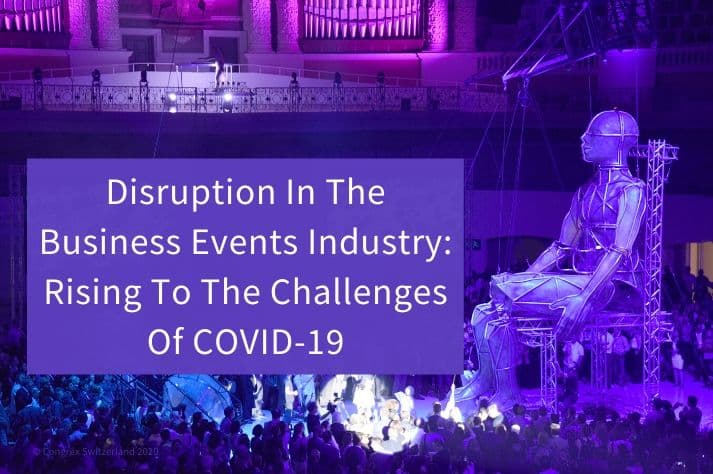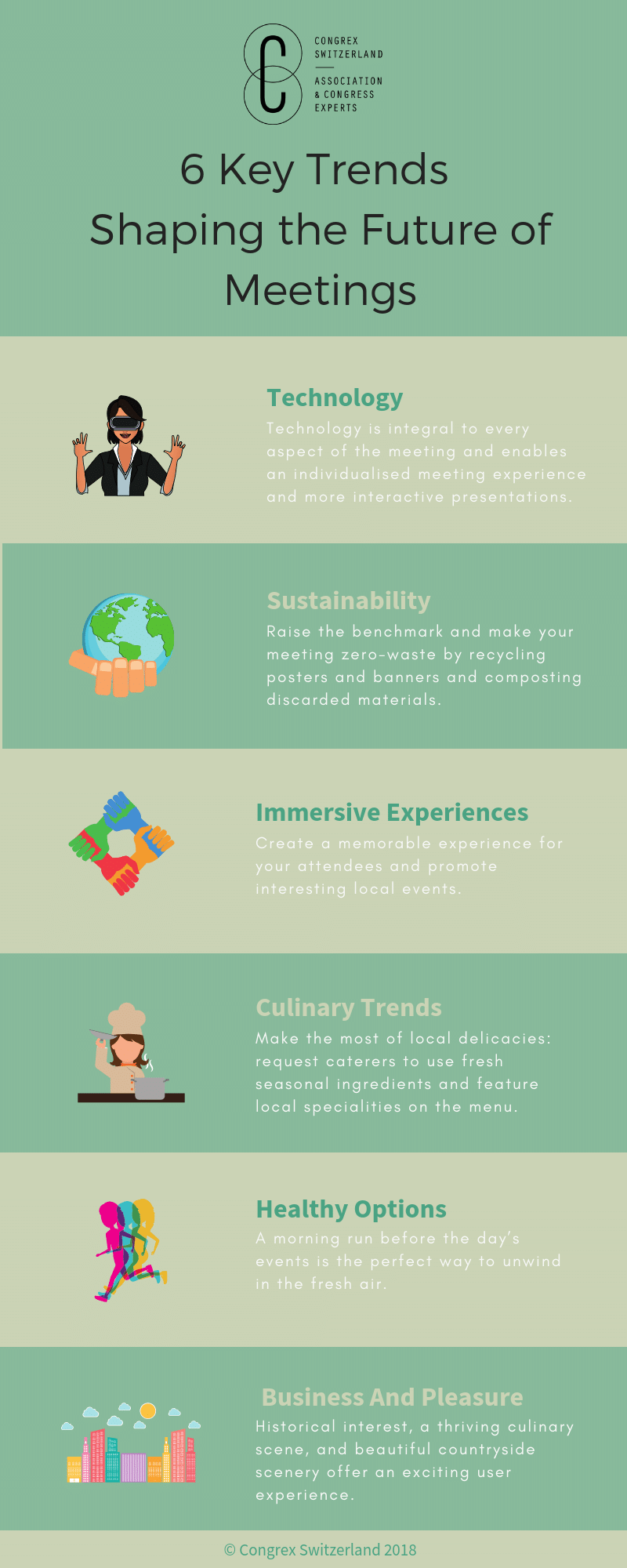 If there is one subject driving the conversation among meeting and event planners and organisers today, that has to be disruption. In a matter of weeks, the global landscape has changed enormously, and professionals in the meetings industry now face the pressing need to make tough decisions quickly.
If there is one subject driving the conversation among meeting and event planners and organisers today, that has to be disruption. In a matter of weeks, the global landscape has changed enormously, and professionals in the meetings industry now face the pressing need to make tough decisions quickly.
Download this article as PDF: DOWNLOAD
It is clear that the meeting industry has been strongly affected by the disruptive effects of COVID-19 (SARS-COV-2). Since the onset of the epidemic, hundreds of events have been cancelled all over the world, and waking up to the news of cancellations or postponements has become the new normal.
In this unusual scenario, event organisers are required to reconsider their options and to balance two priorities: on the one hand, it is crucial to uphold the health and safety of staff, sponsors, and attendees; and on the other, it is necessary to meet financial obligations – or at the very least to minimise the losses caused by disruption.
Of course, acknowledging the gravity of the situation does not equal underestimating the value of events. After all, these are the spaces where high-level debates take place and where fruitful professional relationships can be forged. Events bring professionals together and also connect them to associations and sponsors in a more direct and relatable way, which can generate tangible benefits and strengthened loyalty.
RELATED: Guidelines on Coronavirus and COVID-19
So if events are invaluable, what is next for the MICE industry? And are there any best practices to cope with large-scale disruption? At this critical junction, learning to navigate the situation requires extensive planning and the willingness to adapt fast. In this paper, we explore the options available to event planners and organisers and some key considerations to minimise disruption.
Meetings, Events And COVID-19: Five Options To Consider
In today’s rapidly changing environment, preparedness and crisis management should be integral aspects of event planning. Many organisers now wonder whether their meeting can still go ahead. In most cases, the answer should be yes, whether that means at a later date or in an alternative format. All in all, organisers have five options to consider.
1. Cancellation
In some cases, facing disruption will mean cancelling an event. We have already seen significant events like Mobile World Congress, IMEX, ITB Travel Trade Show, or the Geneva Auto Show follow this course of action. This may be the way to proceed if it becomes clear that the organiser cannot guarantee the safety of participants, or if they anticipate logistics problems due to travel restrictions. In this situation, all efforts must be concentrated on communication and mitigating the negative effects of the cancellation and delivering high standards of service to suppliers, sponsors, and those who had registered. Handling refunds, insurance claims, and contract fulfilment can be a tricky road to navigate, so it may be worth seeking the support of legal experts. A clear and professional communication strategy is needed and participants, speakers, exhibitors, hosted buyers and sponsors should be told openly about the reasons for cancellation and why this step was taken. You need tailored emails to all parties involved, followed by personal phone calls to selected stakeholders.
2. Postponement
We have also seen several organisers postpone their event, such as the Olympics, the ILC International Liver Congress or Open Networking & Edge Summit, which moved their event dates from the spring to late summer and autumn. Postponement is not a unilateral decision since hosting an event at a later time requires the approval from venue managers, suppliers, and sponsors. Before proceeding, it’s also essential to gauge the response of attendees too. And because it is hard to predict how the situation will evolve, relevance becomes an issue. The postponement may not be an option for events where the focus is on delivery of cutting-edge information or time-sensitive data, since the content may not be relevant in a few months.
3. Relocation
A third option is to maintain the event date but choose a new location. However, since events take months to plan, organisers need to be prepared to operate with little room for manoeuvre. There may be limited options in terms of venues, travel arrangements, and accommodation. Moreover, there are financial considerations of dropping a venue, or a hotel may affect overall profitability, as penalties may be involved. For organisers that decide to go ahead with relocation, new details must be communicated in a timely manner, which requires tweaking your pre-event communication campaign.
These three options still hold onto a traditional event format, which involves face-to-face meetings where many people converge at a single location. Although disruption does not mean the end of traditional meetings, their limitations are becoming all the more evident in the current situation.
Over the past few years, we have witnessed an explosion of new technologies that have given rise to exciting opportunities for the business event industry. We now have the means to develop alternative meeting formats that allow people to meet and interact remotely. Virtual and hybrid events emerge as two additional options to consider in the face of disruption.
4. Virtual events
Over the past few weeks, a significant number of meetings and conferences have been redesigned as virtual events. If adaptable, this meeting format is probably the best alternative in these challenging times. By their very nature, virtual events allow attendance irrespective of travel restrictions and facilitate the delivery of vanguard information. Moreover, this format is perfectly compatible with event marketing and sponsorship strategies while allowing planners to be ready for any eventuality. And as long as they are strategically planned using the right technologies, virtual events can even reach a wider audience than traditional live events.
5. Hybrid events
Hybrid events feature a mix of live and virtual components. In this model, a number of people may be present at a physical location, while the audience at large attends the event remotely. Hybrid events have several advantages: they may attract sponsors who would not have otherwise been drawn to a live event, and if needed, they can be easily modified and turned into virtual events. On the other hand, the logistics involved in this type of event are more complex, as they require two kinds of infrastructure: physical and digital.
All event types have their pros and cons, whether in-person or remote. For organisers, the challenge lies in identifying the meeting model that suits their needs best. Presently, hybrid and live events should be a top consideration for associations and organisations that have events lined up in the future. We will now examine their advantages in detail.
The Benefits Of Virtual And Hybrid Events
Professional events have several key functions: bring brand awareness and revenue for the organiser, sharing up-to-date information, and networking. For a long time, traditional face-to-face meetings seemed the best way of achieving this, and resistance to adopting new meeting formats mainly came from not knowing how valid these alternative formats were at meeting these objectives.
RELATED: A Complete Guide To Conference Social Media Marketing
As technology evolves, we have come to realise that virtual and hybrid events can fill in the gap left by large-scale cancellations and other restrictions stemming from the current situation. Not only that, but they also offer some substantial advantages:
1. Financial benefits
Virtual and hybrid events can be highly profitable since they partly or wholly eliminate the need for venue rental, certain types of insurance, and additional services like staffing and catering. Therefore, they can help organisers reduce their expenses and operational costs, and consequently increase their ROI potential.
2. Increased attendance
In-person meetings entail geographic and travel constraints that may prevent some participants from attending. These limitations have become more poignant in recent weeks, and so has the fact that these constraints do not bound online events. This type of event can reach a wider audience and remove logistical and financial barriers to attendance.
RELATED: 7 Principles To Increase Conference Attendee Engagement
3. Measurability
The technology used to deliver online events has built-in capabilities that allow organisers to measure success in real-time. Such data can be subsequently used to make changes as and when needed and to gauge the audience’s reaction. In short, online event tech allows for continuous improvement both during and after the event.
4. Ease of transition
Switching to virtual events may be easier than it appears. These events rely on mediums and formats that are already familiar, as we are conducting an increasing number of activities and interactions online. In the majority of cases, the audience will previously have attended some sort of online events, such as webinars or live-streamed training courses.
Therefore, the adaptation process is minimal.
Having established the crucial benefits of virtual and hybrid events, it is now time to dig more in-depth into the different meeting models offered by new technologies.
Types Of Online Events
A central question for event planners and organisers is whether all events can be delivered remotely. With the current technology, anything from scientific sessions to workshops and exhibitions can be delivered virtually. Of course, the specific format will vary, but generally speaking, there are five types of online events. These differ from each other in terms of location and interaction levels.
- Centralised broadcasting from a single location and no interaction with the audience.
- Centralised broadcasting from a single location with full interaction with the audience.
- Centralised broadcasting from a single location with limited interaction with the audience (i.e. only a number of attendees can interact).
- Broadcasting from multiple locations and no interaction with the audience.
- Broadcasting from multiple locations with multiple audience interactions.
Each of these formats requires a different strategy to guarantee optimal delivery and engagement. However, there are some practical and technical considerations that are applicable to all types of virtual events.
These include:
- The specific technologies and platforms to be used.
- The bandwidth needed to support smooth delivery and participation, if applicable.
- The interaction model to follow if Q&A sessions are planned.
- The tools needed to facilitate networking.
- How will the event be marketed and monetised?
- How will engagement metrics be measured during the event?
- How will feedback from attendees be collected?
Irrespective of the event type, all planning should be geared towards boosting interaction and supporting virtual infrastructure. Next, we will take a look at some ways of doing this.
Tips for successful virtual meetings
Online events are developed in the virtual sphere and are not bound by the restrictions of physical environments. Although they have important advantages, they lack the visual cues that govern face-to-face interaction. One of the key challenges is keeping them interactive in an orderly manner. To do that, planning strategies should focus on anticipating potential obstacles and facilitating participation, interaction, and the delivery of key messages.
Anticipate the obstacles
These are likely to be technical (e.g. lag in communications that can create obstacles to the natural flow of the meeting). Key actions include testing and ensuring that tech providers have extensive experience.
If you anticipate technical issues that could affect meeting delivery, it may be worth considering pre-recorded sessions. Not all content in virtual events has to be live!
To minimise software or technical problems, it is also essential to ensure that all participants are on the same page. This can be achieved by contacting them in advance with detailed instructions on which software will be used and by sending them a quick set-up guide.
The role of facilitators
Even if technology runs smoothly, managing interactions can be challenging. Any virtual event that involves audience participation must necessarily have a moderator or facilitator to ensure the smooth running of the meeting and adherence to schedule. Facilitators should be well versed in virtual etiquette – and so should be the audience, so make sure to circulate emails that explain in detail the event’s participation protocols.
Gathering feedback
To facilitate feedback, each meeting should have at least one note-taker whose role is to track participants’ questions and comments and bring them to the fore at the right time. Note-takers can also prepare event highlights with most thought-provoking comments or conversations and circulate them among participants after the event.
Virtual meetings are still social events
Do not overlook the social aspect of meetings. Remember that virtual meetings should fulfil two critical functions: circulating information and providing a space for professionals to network. This means that an online event still requires introductions, ice breakers, and virtual watercooler or coffee break sessions.
What we have discussed so far applies to events with an online component, whether they are entirely virtual or not. Next, we will look into a few additional considerations applicable to hybrid events.
A Note On Hybrid Events: Have A Backup Plan
Hybrid events combine live in-person and remote attendance options, so they eliminate many attendance barriers. This type of online events may suit seminars, lectures, conferences, training workshops, and congresses.
At the time of writing, hybrid events are still an option in certain areas, as long as the number of face-to-face participants is kept in line with local regulations. In the current environment, hosting a hybrid event may be a right way of covering all bases if your event is still a few months away. In these uncertain times, every event planner should develop a backup plan, and hybrid events may fit the bill.
Hybrid events also require a backup plan. It may be wise to plan for ways of turning it into a 100% virtual event if need be. Here are some things to consider:
- A registration transfer policy from in-person to online attendance.
- Being ready to offer discounted rates if in-person elements cannot go ahead.
- A plan to record sessions and make them available after the event.
- The ability to schedule video appointments with other attendees, exhibitors, or speakers.
- Considering how changes may affect sponsorship packages and devising strategies that ensure maximum visibility online.
Professional Conference Organisation and Event Planning: What’s Ahead?
Throughout this paper, we have highlighted the value of virtual events during the challenging times that now affect the meeting industry. Virtual events can generate higher attendance numbers, increase engagement, and result in a significant reduction in operational costs.
Despite the uncertain environment that surrounds us, there is no reason to think that in-person meetings will cease to exist. However, we can expect online events to become increasingly significant, and the current challenges are likely to accelerate a widespread switch to virtual and hybrid event formats. Undoubtedly, this puts pressure on organisations, organisers and planners, who must be ready to take their event into the digital sphere while offering outstanding value to all stakeholders.
As event planners and organisers, the call to embrace innovation is stronger than ever before. In-person events cannot be simply transferred into the digital world since virtual events need a different blueprint. Now is the time to start devising innovative strategies that can deliver engagement and meet financial objectives through virtual delivery. Getting ready for a new landscape in the meetings industry also means rethinking how we connect with and attract people to events, by listening to their expectations and limitations and also by learning from what other industry players are doing.
In doing so, we will be taking the necessary steps to rise to the challenges at hand, and at the same time, we will be building a more robust and profitable approach to event organisation.
Download this article as PDF: DOWNLOAD
— —
ABOUT CONGREX SWITZERLAND
Congrex Switzerland is a leading Professional Congress Organiser and Association Management Company.
We offer a complete range of integrated solutions to a variety of international clients, especially non-profit organisations. This covers every aspect of conference organisation, from the management of hotel accommodation to strategic consulting for all types of medical and scientific organisations.
Every year we typically manage between forty and fifty events involving around 80’000 participants.
Get in contact















